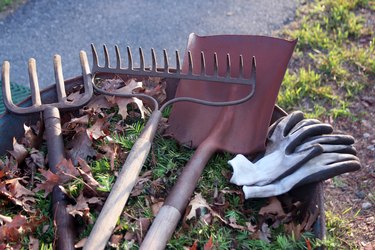
In addition to being unsightly, rust can eventually chew holes through your favorite knife or other metal objects. To avoid this, you'll want to address rust problems as soon as you spot them. Fortunately, you can usually remove rust stains with baking soda and a little elbow grease if you catch them early.
Why It Works
Video of the Day
Baking soda works to remove rust in two ways. The first is with grit. Baking soda is slightly abrasive, which gives it some scrubbing power to clean away rust.
Video of the Day
It can also use a chemical reaction to tackle rust. Baking soda is an alkaline, or basic, substance. As such, it reacts with acids like vinegar to form bubbles. This bubbling action helps to lift rust off metal surfaces. The fizzing action works on other stains too, so you're likely to encounter a lot of recipes for homemade cleaners using baking soda and white vinegar if you look online for cleaning tips.
Removing Rust With Baking Soda
To remove rust with baking soda, add water to the soda to make a paste. Spread the paste over the rust spot, covering it completely, Pour a little white vinegar on top of the baking soda and then walk away. Leave the rust to soak under the soda and vinegar mixture for a few hours so it has time to work.
When you come back, scrub the rust with a piece of wet steel wool or a wire brush. You can also use crinkled-up aluminum foil as a cleaning tool. Rub the rust away vigorously and then rinse the item in warm water to remove any remaining baking soda residue. Repeat the process if necessary and then dry the object thoroughly when you're done.
Rust-Removal Alternatives
Baking soda and vinegar remove surface rust well but may leave a little rust behind. If so, you can try to remove the rust again using a potato. No, that's not a typo. Potatoes contain oxalic acid, which reacts with rust and can help remove it.
To try this method, cut a potato in half. Dip the cut end in dish soap and then place it on the rusty surface. Leave it to sit for a few hours and then scrub the rust away with a piece of wet steel wool. If the rusted object is small enough, soaking it in straight vinegar can also do the trick.
These rust-removal solutions are all natural and you likely have what you need in your pantry already. For larger areas of rust, such as on a car hood, you may find it easier to simply purchase a commercial rust remover. Naval jelly, for example, works well, is easy to use, and takes only about 10 minutes to do the job.
Rust-Removal Don'ts
There are a few rust-removal home remedies that work but may have downsides that you should consider. One is lemon juice. Lemon juice, often used in combination with salt, can remove rust well. You don't want to leave the lemon juice on surfaces for long, however, as lemon juice is more acidic than vinegar. This means soaking some items in lemon juice too long may damage them. If you want to use lemon juice for a rust stain, stick to stains on porcelain and ceramic.
It's also best to avoid using cola or another type of soda to remove rust. It can and will do so, but it also leaves behind a sticky mess. If you soak an item in cola to remove the rust from it, you'll need lots of hot soapy water to remove the cola when you're done. It can be hard to clean items thoroughly if they have a lot of nooks and crannies.